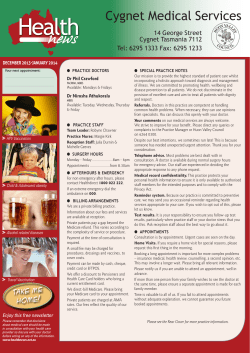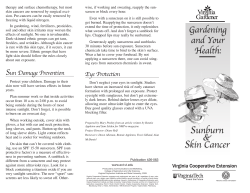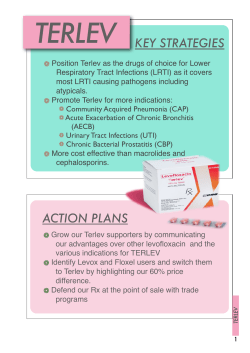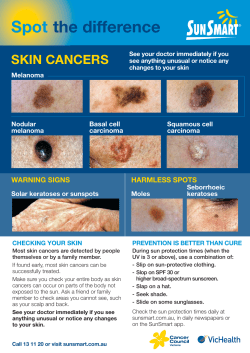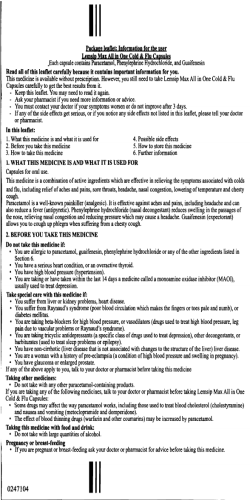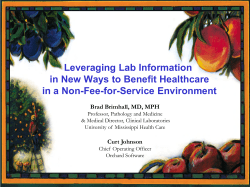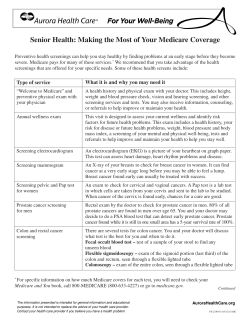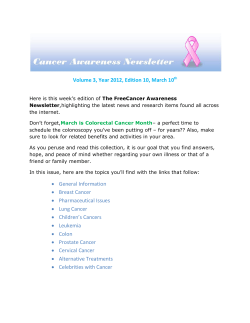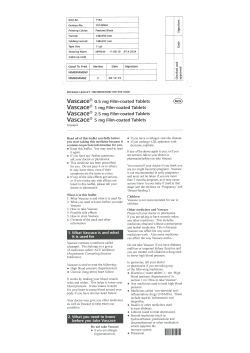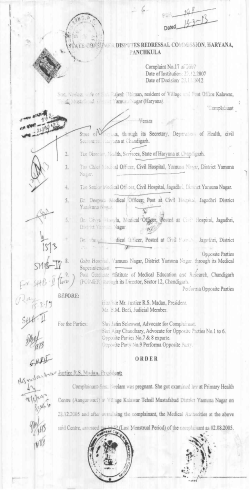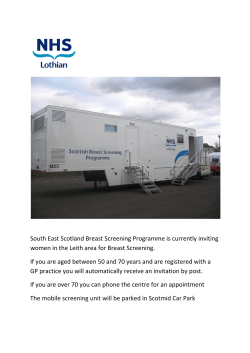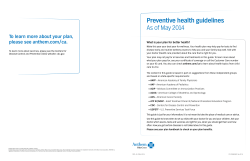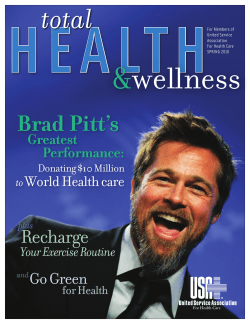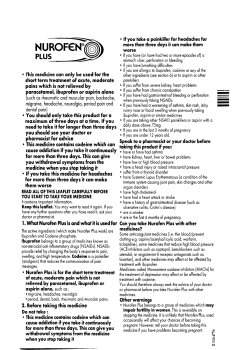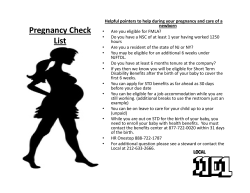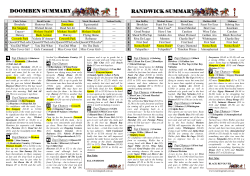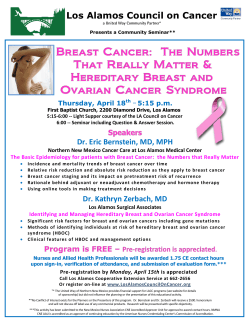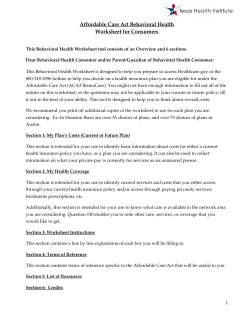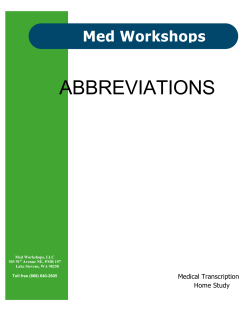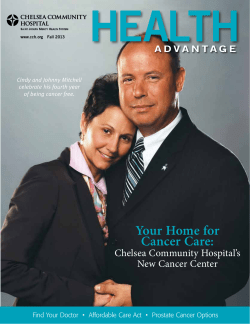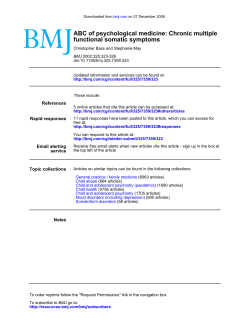
You’ve Got the Power cancer to lower
You’ve Got the Power to lower your chances of getting cancer Did you know....? In Connecticut and the United States, people of color are more likely than others to get certain cancers. 1 GET THE FACTS ABOUT CANCER What are my risks? What is cancer? See the Check List Everything in your body is made up of cells. Cancer can happen when some of those cells become damaged. They begin to grow out of control and form clumps called tumors. Some tumors are cancers. on page 7. Cells can break away from cancer tumors and form new tumors in other parts of the body. As cancer tumors grow and spread, they harm healthy body parts. There are more than 200 different kinds of cancer. Most are named for the part of the body where the first tumor grows (lung, breast, liver, etc.) Once you have a tumor, your body can not get rid of it on its own. It needs to be treated by a doctor. What causes cancer? Scientists don’t know exactly what causes most cancers. They do know that many things can harm your cells and add to your chances of getting cancer. These things are called “risk factors” for cancer. What are the risk factors for cancer? Your Age and Your Sex Cancer can strike at any age, but your chances of getting it grow as you get older. Only women can get certain kinds of cancer, like cervical, ovarian, and uterine cancers. Only men can get prostate cancer. Your Genetic Makeup The genes that are passed on to you by your parents could make it easier for you to get certain cancers of the breast, bowel (colon), ovaries, and uterus. Your Lifestyle • Smoking No matter who you are, you can take actions to help you stay healthy 1 You’ve Got the Power! Smoking causes nearly all lung, mouth, and throat cancers. Smoking also adds to your chances of getting pancreatic, bladder, kidney, and cervical cancers. You can choose not to smoke. • Being Overweight If you weigh too much for a person of your height, this could add to your chances of getting cancer of the bowel (colon), kidney, esophagus, and lining of the uterus. It could also increase your chances of getting pancreatic and gallbladder cancers. You can decide today to eat better and to exercise to help control your weight. 2 • Alcohol If you are a woman who has more than one alcoholic drink a day, or if you are a man who has more than two drinks a day, this could increase your chances of getting cancers of the liver, mouth, throat, esophagus, and larynx. If you are a heavy drinker and you also smoke, your chances of getting mouth cancer are even greater. You can choose to cut back on how much alcohol you drink. • Poor Eating Habits If you don’t eat many fruits, vegetables, and whole grains, this could increase your chances of getting some cancers. If you eat a lot of red meat, especially meat high in fat, this could increase your chances of getting bowel (colon) cancer. While you may love many of the foods you grew up with, you can make better choices today to lower your chances of getting cancer. • Infections You can’t catch cancer from someone else. But if you have certain long-lasting infections (which only a doctor can find), they could increase your chances of getting cervical, liver, stomach, mouth, and throat cancers. You can choose to see your doctor regularly, even when you feel okay. Your doctor can find and treat infections that could lead to cancer. • What’s Around You, • and What You’re Around Even people of color can get skin cancer. If you spend a lot of time in the sun but don’t use sunscreen or wear protective clothing, this adds to your chances of getting skin cancer. Tanning lamps and tanning beds also can cause skin cancer. WHO IS AT RISK FOR CANCER? Cancer does not discriminate. Each year in Connecticut, about 20,000 new cancers are found, and more than 7,000 people die of cancer. One in two men and one in three women will get cancer in their lifetime. Lung, prostate, breast and bowel (colon and rectum) cancers are the most common kinds. They cause more than half of all new cancers and more than half of all cancer deaths. People of color are more likely than others to get certain cancers. They also are more likely to die from some forms of cancer. Doctors don’t know exactly why, but it might have to do with things like unhealthy lifestyles and choices, if you don’t get regular health check-ups, if the cancers are found late, how the cancers are treated, and if you have other illnesses at the same time. You’ve Got the Power to lower your chances of getting cancer If you are exposed to asbestos, certain pesticides, or certain chemicals at home or at work, they could add to your chances of getting cancer. 3 4 GETTING TESTED FOR CANCER Many cancers can be found early, treated, and cured You may not think you need to see a doctor unless you feel sick. But a doctor can do tests and find certain cancers before they make you feel sick. These tests are called “screenings.” The good news is that you can get screened for breast cancer, cervical cancer, bowel (colon and rectum) cancer, and prostate cancer. Screening tests can find cancers early, when they are easier to treat. Some of these tests can find growths that can be taken out before they become cancers. You can’t find these things yourself. Only a doctor can find them. What tests do I need? You need to get tested for different cancers when you reach certain ages. The guidelines of the American Cancer Society are given here. Talk with your doctor about your cancer risks and which tests you need. Don’t be afraid to ask questions. You may need to get tested sooner or more often if your risk level is high. Getting tested for cancer is a wise choice that will help keep you healthy. You’ve Got the Power! SCREENING GUIDELINES* WOMEN Age 20 and over Each time you go for a health exam, get your thyroid, mouth, skin, lymph nodes, and ovaries checked. Ask your doctor if you need to get any cancer screening tests. Age 21 and over (younger if you have ever had sexual intercourse) To screen for cervical cancer, get a Pap test every year. Age 20-39 To screen for breast cancer, get a breast exam by your doctor every 3 years. Age 40 and over To screen for breast cancer, get a mammogram (breast x-ray) and breast exam by your doctor every year. Age 50 and over To screen for colon and rectum cancer: • Get a blood stool test every year, or • Get a sigmoidoscopy every 5 years, or • Get a double-contrast barium enema every 5 years, or • Get a colonoscopy every 10 years MEN Age 20 and over Each time you go for a health exam, get your thyroid, mouth, skin, lymph nodes, and testes checked. Ask your doctor if you need to get any cancer screening tests. Age 45 and over (African Americans and men with a family history of prostate cancer) To screen for prostate cancer, get a rectal exam and prostate (PSA) blood test from your doctor every year. Age 50 and over (all other men) To screen for prostate cancer, get a rectal exam by your doctor every year, and talk with your doctor about getting a prostate (PSA) blood test. Age 50 and over (all men) To screen for colon and rectum cancer: • Get a blood stool test every year, or • Get a sigmoidoscopy every 5 years, or • Get a double-contrast barium enema every 5 years, or • Get a colonoscopy every 10 years * Based on American Cancer Society Guidelines 2005 5 6 WHAT ARE MY CANCER RISKS? WHAT CAN I DO TO LOWER MY RISKS? Fill out this page, and go over it with your doctor. If you have many risks, it doesn’t mean you will get cancer. It will help you and your doctor to talk about what you can change to help prevent cancer. Your choices in daily activities can make a big difference. Many cancers can be prevented or caught early through screenings, and the time to take action is now. MY CANCER RISKS My Name____________________________________ My Age______________ Look at the end of this booklet to find out where to get information and help. ® My mother, father, sister, or brother has cancer or has had cancer. ® I smoke cigarettes, cigars, or a pipe, or I used to smoke. ® I am very overweight. ® On most days I don’t exercise enough to make me breathe harder and to make my heart beat faster. ® I eat less than 5 fruits and vegetables a day. ® I eat red meat, pork, ham, bacon, or fatty and fried foods (chips, french fries, doughnuts, hot dogs, etc.) several times a week. ® I eat pickled foods or highly salted foods several times a week. ® I am a woman who has more than one alcoholic drink on most days. ® I am a man who has more than two alcoholic drinks on most days. ® ® ® ® I get heartburn every day or most days. I have had sex with many different people in my life. I do not use condoms (rubbers) during sex. I am in contact with fumes, chemicals, smoke, or asbestos at my job or where I live. ® I do not use sunscreen or wear protective clothing when I am in the sun, or I use tanning lamps or beds. One thing I will change is: _______________________ 7 • Follow the screening guidelines from the American Cancer Society on page 6, even if you live a healthy lifestyle and have no family history of cancer. • Ask your relatives about the history of cancer in your family. Tell your doctor what you know. • Quit smoking. If you need help quitting, ask your doctor for help, or phone Connecticut QuitLine 1-888-363-4224. • If you weigh too much, ask your doctor how you can lose weight safely. • Get more active. Try doing something for at least 10 minutes a day. Walk. Ride a bicycle. Climb stairs. Do yard work or housework. Exercise can help keep your weight down. • Choose healthier foods. • Eat more fruits and vegetables, 100 percent juices, and tomato sauce. • Eat less red meat, pork, ham, bacon, fried foods, fats (butter, margarine, shortening, lard, etc.) and fatty foods like chips, doughnuts, candy bars, and cookies. 8 • Eat more fish and more chicken or turkey (without skin). Eat less hot dogs (even those made of turkey) and less cold cuts and lunch meats like salami and bologna. You can get help and information • You can learn how your daily choices affect your health. • You can be an informed consumer. • You can find out if you have any risk factors. • Eat more foods made with whole grains, like whole wheat, oats, and brown rice. Eat less foods made with processed grains, like white bread, white flour, and white rice. • You can learn how to lower your chances of • Eat less pickled foods and less heavily salted foods. • You can choose to go to a doctor and ask for • Eat less foods made with sugar or corn syrup, and drink less soda and other sweetened drinks. • You have the right to ask for a doctor who • Drink milk that is fat-free or low-fat. Eat low-fat cheeses and yogurt. • Read food labels. Try to avoid foods that contain “saturated fat,” “vegetable shortening,” and “hydrogenated” or “partially hydrogenated” fats and oils. • Cook with olive oil or canola oil, instead of margarine, butter, shortening, lard, bacon grease, or other fats and oils. • If you get heartburn on 2 or more days a week, talk to your doctor. • Use condoms (rubbers) when you have sex. • Use sunscreen. Stay out of the sun from 10 a.m. until 2 p.m. Don’t use tanning lamps or beds. 9 HELP IS AVAILABLE getting cancer. • You can get help making healthier choices. • You can learn where to go for help. cancer tests. speaks your language or a translator who does. • You can find out what questions to ask before you see your doctor. You can make a list. • You can tell your doctor when you don’t understand and need more information. • You can get tested for some cancers even if you don’t have insurance. • You can get rides to the doctor. No matter who you are, you can take actions to help you stay healthy. You’ve Got the Power! 10 USE YOUR POWER! • Cancer Information Service Where to get help and information • 2-1-1 InfoLine Dial “2-1-1” on your telephone, free from anywhere in Connecticut. www.211infoline.org You can get help finding health insurance, health care, support groups, child care, food, clothing, housing, rides, health care people who speak your language, and many other services. Available 24 hours a day, every day of the year. You can talk with people who speak your language. TDD access is available. • American Cancer Society 1-800-ACS-2345 (1-800-227-2345) www.cancer.org You can get information about cancer 24 hours a day, 7 days a week. You can get help finding local services and answers to your cancer questions. • Asian Family Services, Inc. 1921 Park Street, Hartford, CT 06106 1-860-951-8770 www.asianfamilyservices.org Social and mental health services, substance abuse treatment, support group for the elderly, and help for Asians who are new to Connecticut. Web site is in English, Cambodian, and Vietnamese languages. of New England 1-800-4-CANCER (1-800-422-6237) Monday through Friday 9 a.m. to 4:30 p.m. cis.nci.nih.gov You can get your questions answered, get information about cancer, and learn what questions to ask your doctor about cancer. In English or Spanish. • The Capitol Region Conference of Churches 1-860-236-1295, Ext. 25 www.conferenceofchurches.org Faith-based outreach, and Health Ministry Network. • Connecticut Breast and Cervical Cancer Early Detection Program 1-860-509-7804 www.dph.state.ct.us You can get free breast and cervical cancer screening services and follow-up, if you don’t have health insurance or if your insurance won’t pay for them. • Connecticut QuitLine 1-866-END HABIT 1-866-363-4224 If you want to quit smoking, call for free information and counseling. In English and Spanish, 24 hours a day, 7 days a week. • Great American Health Check • BlackHealthCare.com www.blackhealthcare.com Health and medical information for African Americans. Help finding an African American doctor. • Black Women’s Health Imperative 1-202-548-4000 www.blackwomenshealth.org A source of health information, products, and programs for African American women. Help finding an African American doctor. “Check Up” section helps you measure, track, and manage your personal health, health care, and fitness. 11 www.cancer.org (Click on link on homepage.) At this web site, you answer questions about yourself, then get your own Health Action Plan to share with your doctor. It will tell you if you are making good choices in your lifestyle, which cancer screening tests you should get, and when to get them. • Hispanic Health Council 175 Main Street, Hartford, CT 06106 1-860-527-0856 www.hispanichealth.com Information about preventing cancer and finding it early. Individual and group support for Latinas with cancer; emotional support, stress management training, current information on cancer treatment, help with medical support, and help with medical examinations and appointments. 12 • Mashantucket Pequot Tribal Health Services & Indian Health Service Program 75 Route 2 Mashantucket, CT 06339 1-860-312-8000 You can get free health care services if you are a member of a federally recognized tribe and live in New London County. If you are a member of a state-recognized tribe, you may be eligible for certain services at no cost. • My Family Health Portrait 1-888-275-4772 www.hhs.gov/familyhistory This is a free program you can put on your computer to help you to learn if any diseases run in your family. • National Alliance for Hispanic Health Use Your Power! This guide was produced by the Connecticut Department of Public Health and the Connecticut Cancer Partnership, in collaboration with Asian Family Services, The Capitol Region Conference of Churches, the Hispanic Health Council, Mashantucket Pequot Tribal Nation, and University of Connecticut School of Medicine, with funding from the U.S. Region 1 Office of Minority Health and the Centers for Disease Control and Prevention (Cooperative Agreement Number U55/CCU121932-04). 1-202-387-5000 www.hispanichealth.org Fact sheets on cervical, colorectal, lung, and prostate cancer in Spanish. • Native C.I.R.C.L.E. (Native Cancer Information Resource Center and Learning Exchange) http://mayoresearch.mayo.edu/mayo/research/ cancercenter/native.cfm Cancer education materials for American Indians and Alaska Natives. • Su Familia: The National Hispanic Family Health Helpline 1-866-Su-Familia 1-866-783-2645 Free, confidential health information in Spanish and English. They can refer you to a health care provider near you. Call toll free Monday through Friday 9 a.m. to 6 p.m. Eastern Standard Time. 13 For more copies of this booklet: Phone 1-860-509-7804 e-mail: [email protected] Download from web site: www.ctcancerpartnership.org …… March 2006 The design and layout of this brochure was donated by the Mashantucket Pequot Tribal Nation. cancer to lower your chances of getting You’ve Got the Power Connecticut Department of Public Health Office of Minority Health and Comprehensive Cancer 410 Capitol Avenue Hartford, CT 06106 Place Postage Stamp Here
© Copyright 2026
